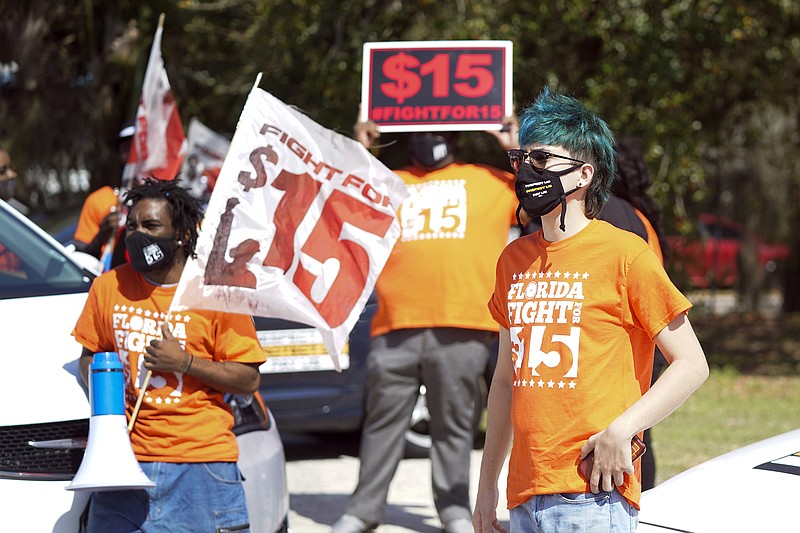It appears the battle for a gradual $15 minimum wage will determine the degree of Democratic desperation.
Democrats were dealt a severe blow Thursday when nonpartisan Senate parliamentarian Elizabeth McDonough said the minimum wage tenet of the party's $1.9 trillion COVID-19 relief bill could not be included if the body attempts to pass the bill through the reconciliation process.
That process would allow the Senate to pass the bill with only 51 votes (48 Democrats, two independents who vote with Democrats and Vice President Kamala Harris), but rules say all provisions of the legislation must be related to the budget and not just tangentially.
McDonough's decision affirmed what is known as the Byrd rule.
Democrats are pondering their next moves.
House Speaker Nancy Pelosi, D-California, said she would go ahead and pass the package in that body regardless of the decision; that was expected Friday night.
Far-left House Democrats insisted the minimum wage be included, some employing "our House, our rules" calls and others misinterpreting why President Joe Biden was elected.
"We cannot allow the advisory opinion of an unelected parliamentarian and Republican obstructionism to stop us from delivering on our promise to voters," the Congressional Progressive Caucus tweeted Thursday night.
"We simply cannot go back to the voters who delivered us the White House and the Senate majority," said the caucus chairwoman, U.S. Rep. Pramila Jayapal, D-Washington, "and tell them that an unelected parliamentarian advised us – based on arcane rules – that we could not raise the minimum wage as we promised."
Some Democrats have suggested McDonough be fired. Others have said they should attempt to pass the minimum wage rise on its own merits. Still others have suggested it be included in another bill - perhaps another stimulus bill - later this year.
U.S. Sen. Elizabeth Warren, D-Massachusetts, on Friday again raised the specter of eliminating the Senate filibuster that requires 60 votes to pass most legislation. If the filibuster rule were eliminated, passage of bills would require only a simple majority vote. Three other far left senators, Bernie Sanders, I-Vermont, Ed Markey, D-Massachusetts, and Alex Padilla, D-California, and two far left Congress members sent out similar tweets.
But the chances of that happening are slim since Democratic Sens. Joe Manchin, D-West Virginia, and Krysten Sinema, D-Arizona, have said they would not support such a measure.
Another Democratic senator, Ron Wyden of Oregon, has something else in mind. His idea - which we imagine would be constitutionally suspect - would charge big corporations a tax penalty equal to 5% of their total payroll "if any workers earn less than a certain amount." Such an amount, he said, would be indexed, likely to inflation, and would increase "over time."
Biden, through his spokeswoman, seemed resigned to the situation.
"President Biden is disappointed in this outcome, as he proposed having the $15 minimum wage as part of the American Rescue Plan," press secretary Jen Psaki said. "He respects the parliamentarian's decision and the Senate's process."
The possibility exists that the Senate could just ignore the ruling, though that would have repercussions when Republicans retake the Senate. Senate Majority Leader Chuck Schumer, D-New York, has said his body won't do that, but he has changed his mind before.
Of course there are more reasonable eventualities.
One of those is working with Republicans on a compromise bill. Some members of the GOP, after all, have proposed a $10 minimum wage, up from the current $7.25. Indeed, Sen. Josh Hawley, R-Missouri, said he plans to introduce legislation that would raise the minimum wage to $15 - but only for businesses with revenues in excess of $1 billion.
His measure, he said, would work in tandem with his "Blue Collar Bonus" tax credit that would help those whose hourly wages are below the national median of $16.15 an hour.
Democrats working together with Republicans would signal the unity to the American people that President Joe Biden spoke of in his inaugural address, but Democrats thus far have resisted.
A last - though not worst - resort is continuing to push companies to raise wages on their own, which is what large corporations have been doing for years. The availability of jobs in the pre-COVID economy forced corporations to do that because they wanted to keep their best employees and not have them leave for work elsewhere.
Similarly, 29 states have passed their own minimum-wage laws, raising it to levels they believe the state can live with. But all states are not the same, which makes a blanket more than doubling of the minimum wage so dicey.
When it comes to raising the minimum wage, there is more than one way to get it done, but it may require that elusive C-word - compromise.
